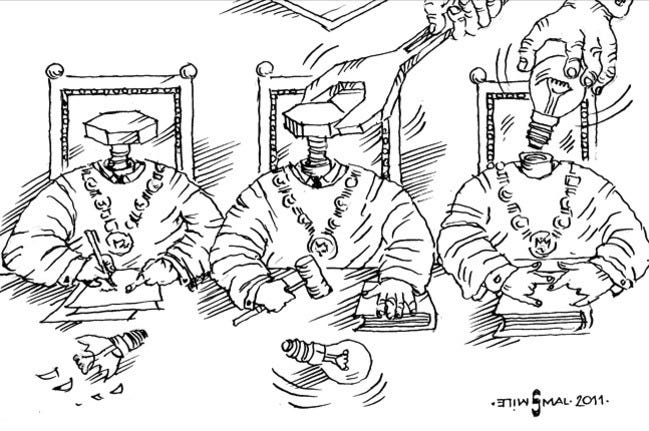Putting the Truba Tapes in Context
Scandalous leaks of illicit recordings reveal politically motivated investigations
Ukrainians have known for years that foreign linguistic experts pick up on much less in conversation than native speakers. However, few expected that the time would come when the standard of competency turns out to be the ability to construe accurately what have been officially classified as state secrets.
While the participants in recordings made last year in the office of Roman Truba, former director of Ukraine's State Bureau of Investigations (SBI), seem to understand exactly what they are saying, the leaders of foreign governments and their emissaries in Kyiv are still struggling to keep up, at least publicly.
Much is taken for granted between the speakers recorded and important communications take place without explicit linguistic reference. To the uninformed and tin-eared, the flow of words seems continuous, despite clear markers of the boundaries of meaningful information.
Professional transcribers know, of course, that listening comprehension is a classic learn-by-doing task, in which it is essential to adopt the strategy of listening for key elements around which to construct meaning, all the while moving along with the flow of discourse.
In reading mode, difficulties can readily be solved by rescanning the text, since the reader controls how information reaches the eyes. But listening is quite different.
Those familiar with the leaked recordings cannot effectively ask decision-makers in the West to listen faster, nor will study of non-normative speech per se produce direct improvement in their ability to hear at the rate Ukraine’s top law-enforcement officials speak.
Ukraine experts who have listened to the conversations are either finding it enormously difficult to understand what was actually said or are still playing dumb while busily compartmentalizing the information for future use. The same goes for the SBU State Security Service, which has ignored the criminal scandal altogether.
As an example, consider this snippet, dated July 17, 2019, in which [now former] SBI Director Truba reports to [now former] President's Office head Andriy Bohdan about the political persecution of Ukraine's fifth President Petro Poroshenko.
Here is a partially translated transcript of the chit chat.
Truba to Bohdan: …As I understand it, we need some legal result in this proceeding ... Even if we call [Poroshenko] in on Friday [for questioning], it will be a circus. He will manipulate [the proceedings] to make it look like he is a victim. ... Andriy Yosypovych [Bohdan], I promise you that I will do everything! …This is a priority for us. … I filed 15 requests involving the ex-president 10 days ago. … There is another issue: the psychological state of my investigators. Of course, I support them in the sense that they are now the most important investigators in this country. I'm getting no cooperation from the National Police, which doesn't assign investigators to the cases, or from the SBU, which also refuses. That makes it very difficult to investigate these kinds of cases involving ex-President [Poroshenko]…
In Ukraine just like anywhere else, people interrupt each other and talk at the same time, ambient noise masks speech sounds, and officials do not pronounce words as consistently as the written language would lead us to believe. But missing (and superfluous) acoustic signals are more than compensated for by situational and contextual elements in the conversations.
That some hear what may be obscured or totally lacking in the recordings is principally because a significant portion of what can be understood is supplied by the context of the exchanges. Native speakers draw on vast amounts of shared knowledge to construct meaning when they are listening. It is not so much that the speech sounds contain meaning; it is rather that they trigger meaning.
The informed listener can easily fill in the missing or slurred elements — including the name Poroshenko — by assuming both Truba and Bohdan are both interested in making his life as miserable as possible, even though neither elaborates that knowledge in depth.
The ability to fill in missing information, a commonplace in human behavior, has been termed analysis by synthesis by psychologists. It refers to the strategy of internally generating or shadowing what people say (or do) so that we may more easily reduce the number of possibilities to consider.
Policy makers in the West should take the time and make full use of their processing capacity to thoroughly study the "Pipe has Burst" recordings, if only to understand how the charges against Poroshenko were concocted and why Prosecutor General Ruslan Ryaboshapka was sacked on March 5 for failing to endorse them.



